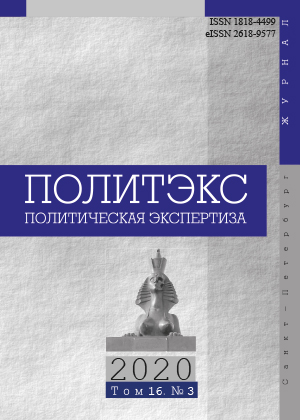BACK TO THE BEGINNING OF THE FUTURE: COMPARING DIGITAL POLICIES OF THE NETHERLANDS AND GERMANY
DOI:
https://doi.org/10.21638/spbu23.2020.304Аннотация
The aim of this article is to compare the introduction of digital technologies in public administrations in the Netherlands and Germany. In academic research, models are developed to analyse the level of digitalization and performance of different organizations. Models serve to simplify reality in research, but the danger exists that this simplification starts to shape our understandings of different issues. In order for one to understand the current state of affairs, an understanding should be built towards the first initiatives regarding the digitalization of public administrations. Therefore, in this article, the policy notes of the Netherlands from 1995 and Germany from 2001 have been analysed and compared to determine the differences in designing and implementing digital technologies in public administrations. Different elements of the policy notes have been manually selected to offer a credible comparison of the two approaches towards digitalization. Due to the scope of this research, limited information has been provided about the influence of initiatives from the European level on the level of the Member States. The results show that both countries have a specific approach towards digitalization of public administration; the Netherlands focused on the utilization of the potential of digital technologies for her constitutional democracy. Germany, on the other hand, largely focused on developing the appropriate IT infrastructures as well as its central coordination. Finally, in the Netherlands, the government turned into a facilitator, enabling different actors to collaborate in numerous projects, with a strong focus on accessibility and inclusion. In Germany, despite the fact that the government already focused on the development and implementation of an IT infrastructure in the early 2000s, the focus is still laid on improving the digital infrastructure of the country
Ключевые слова:
digital government policies, digitalization, public administration, comparative public policy, Germany, the Netherlands, e-Government, Industry 4.0.
Скачивания
Библиографические ссылки
Barcevičius E., Cibaitė G., Codagnone C., Gineikytė V., Klimavičiūtė L., Liva G., Matulevič L., Vanini I. European Commission, Joint Research Centre. Exploring Digital Government Transformation in the EU, ed. By Gianluca Misuraca. Luxembourg, Publications Office of the European Union, 2019. https://doi.org/10.2760/17207
BMI (Federal Ministry of the Interior, Building and Community). Umsetzungsplan für die eGovernment-initiative BundOnline 2005 (Stabstelle Moderner Staat—Moderne Verwaltung). Berlin, Bundesministerium des Inneren (BMI), 2001.
BMWi (Federal Ministry for Economic Affairs and Energy). n.d. “Digital Agenda”. BMWi. Available at: https://www.bmwi.de/Redaktion/EN/Artikel/Digital-World/digital-agenda.html (accessed: 18.04.2020).
BMWi (Federal Ministry for Economic Affairs and Energy). White Paper Digital Platforms. Berlin, BMWi.6 2017. Available at: https://www.bmwi.de/Redaktion/EN/Publikationen/white-paper.pdf?__blob=publicationFile&v=2 (accessed: 06.05.2020).
BZK (Ministry of Interior and Kingdom Relations). “Digitale overheid op goed peil”. Rijksoverheid, 2016. Available at: https://www.rijksoverheid.nl/onderwerpen/digitale-overheid/nieuws/2016/10/12/digitale-overheid-op-goed-peil (accessed: 06.05.2020).
Chadwick A. “E-government | political science”. Britannica, 2016. Available at: https://www.britannica.com/topic/e-government (accessed: 15.04.2020).
Digital Industry Alliance. n.d. “About us”. Digital Industry Alliance. Available at: https://digitalindustryalliance.eu/about-us/ (accessed: 10.05.2020).
European Commission, & Directorate-General of Communications Networks, Content and Technology. eGovernment Benchmark 2019 country factsheets. Luxembourg, Publications Office of the European Union, 2019. https://doi.org/10.2759/641548
EZK (Ministry of Economic Affairs and Climate Policy). Nederlandse digitaliseringsstrategie 2.0 (122042). EZK, 2019. Available at: https://www.rijksoverheid.nl/documenten/rapporten/2019/07/05/nederlandse-digitaliseringsstrategie-2.0 (accessed: 06.05.2020).
Janowski T. “Digital government evolution: From transformation to contextualization”. Government Information Quarterly, 2015, vol. 32(3), pp. 221–236. https://doi.org/10.1016/j.giq.2015.07.001
PwC. “Die vernetzte Verwaltung: Digitalisierung aus der Bürgerperspektive”. Germany, PricewaterhouseCoopers, 2017.
Schröder C. Herausforderungen von Industrie 4.0 für den Mittelstand. Bonn, Friedrich Ebert Stiftung, 2016. Available at: http://library.fes.de/pdf-files/wiso/12277.pdf (accessed: 08.05.2020).
Tweede Kamer (The House of Representatives). J. Kohnstamm (BZK). Information services publicsector. Kamerstuk 20644 | nr. 23, nota. Tweede Kamer der Staten-Generaal. 1995. Available at: https://zoek.officielebekendmakingen.nl/kst-20644-23.html (accessed: 18.04.2020).
Tweede Kamer (The House of Representatives). Report of general consultations (Information services public sector). Kamerstuk 20644 | nr. 26. Tweede Kamer der Staten-Generaal. 1996. Available at: https://zoek.officielebekendmakingen.nl/kst-20644-26.html (accessed: 18.04.2020).
Zahran I., Al-Nuaim H., Rutter M., Benyon D. A Critical Analysis of E-Government Evaluation Models at National and Local Municipal Levels. The Electronic Journal of E-Government, 2015, vol. 13(1), pp. 28–42. Available at: http://www.ejeg.com/issue/download.html?idArticle=419 (accessed: 01.05.2020).
Загрузки
Опубликован
Как цитировать
Выпуск
Раздел
Лицензия
Статьи журнала «Политическая экспертиза: ПОЛИТЭКС» находятся в открытом доступе и распространяются в соответствии с условиями Лицензионного Договора с Санкт-Петербургским государственным университетом, который бесплатно предоставляет авторам неограниченное распространение и самостоятельное архивирование.




